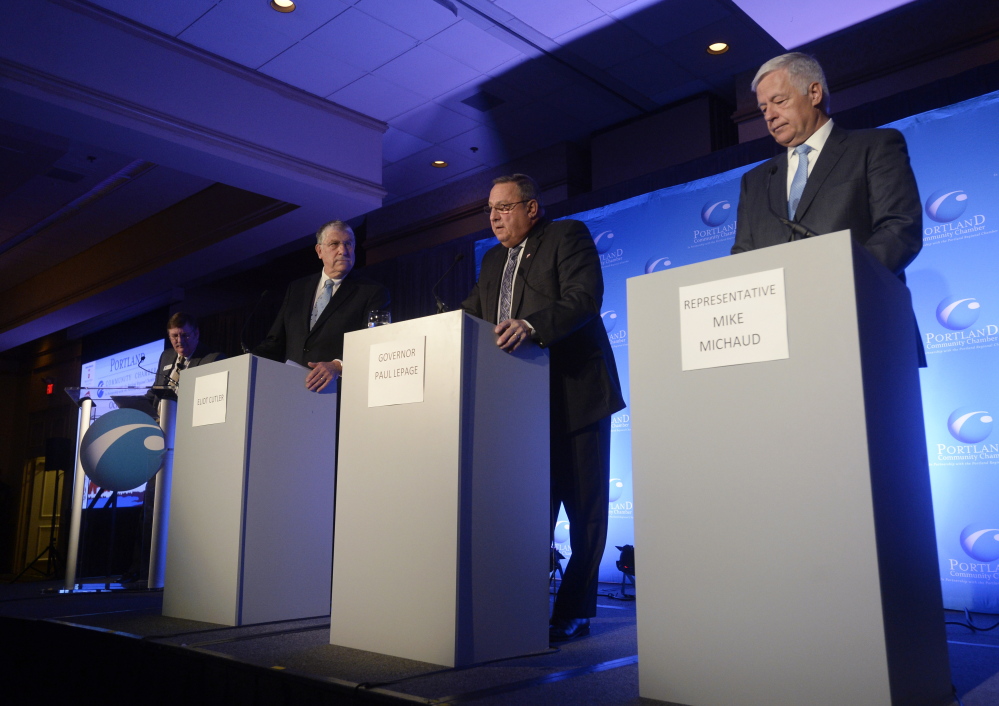The three candidates for governor – incumbent Republican Paul LePage, Democrat Mike Michaud and independent Eliot Cutler – didn’t stray far from the facts during the campaign’s first debate Wednesday.
However, as is often the case with political speech, context was sometimes missing or facts were slightly mixed up.
The Press Herald checked some of the claims and statements made by the three candidates to see how they measure up:
1. LePage, speaking about the demographic challenges facing Maine and how education plays a role, said Maine’s high school graduation rate is 85 percent “but 52 percent (of graduates) that go on need to take remedial courses.”
The governor was correct that Maine’s graduation rate is about 85 percent (86.4 percent in 2013, according to the Department of Education), but he left out an important caveat when talking about college students who take remedial courses.
The 52 percent figure he cited corresponded with the percentage of students enrolled in the Maine Community College System who were required to take a remedial math or English course, according to a system report released this year.
Among students enrolled in the University of Maine System, only 11.4 percent who came from Maine high schools needed remedial courses.
2. Michaud, addressing a question about shifting demographics in Maine, noted that Maine has the oldest population per capita, but has the youngest per capita farmers. LePage, when it was his turn to speak, said Michaud was wrong and gave the correct average age of a Maine farmer: 59.
Where Maine is leading is in the number of farmers ages 25 to 34, a 40 percent increase from 2007 to 2012, according to the U.S. Department of Agriculture’s Farm Census.
3. The candidates were all asked about the minimum wage, and Chris Hall, the Portland Regional Chamber’s CEO, mentioned Portland’s recent proposal to increase the city’s hourly minimum wage from $7.50 to $9.50 immediately and to $10.68 by 2017.
LePage, referring to Portland, said, “They should read the Maine Constitution. They can’t do what they think they can do.”
The constitutionality issue is unclear.
City attorney Danielle West-Chuhta has advised Mayor Michael Brennan and his minimum wage advisory committee that state law does not explicitly prohibit municipalities from setting higher wage levels, although she expressed concerns that the issue has not been litigated in Maine.
4. Cutler, addressing the question about minimum wage, said if the minimum wage had kept pace with the earnings of the top 1 percent over the past 30 years, it would stand at $22 an hour.
That figure matches the conclusion of a 2013 analysis by The New York Times, which relied on federal Bureau of Labor statistics.
Democrats have criticized Cutler for not forcefully supporting a minimum wage increase – and for opposing one in 2010 – but Cutler said Wednesday that raising the wage to $9 or $10 is still probably not “a living wage.”
5. Michaud, addressing a question about expanding Medicaid, which he strongly supports, said it would save $600 million over 10 years, create about 3,000 jobs and bring $3 billion of economic activity into Maine.
Those numbers have been referenced many times by Democrats in support of expansion and can be traced to a Kaiser Foundation analysis.
However, that Kaiser analysis made the projections on the assumptions that all 50 states would expand. To date, only 28 states have expanded Medicaid under the Affordable Care Act.
Copy the Story LinkSend questions/comments to the editors.




Success. Please wait for the page to reload. If the page does not reload within 5 seconds, please refresh the page.
Enter your email and password to access comments.
Hi, to comment on stories you must . This profile is in addition to your subscription and website login.
Already have a commenting profile? .
Invalid username/password.
Please check your email to confirm and complete your registration.
Only subscribers are eligible to post comments. Please subscribe or login first for digital access. Here’s why.
Use the form below to reset your password. When you've submitted your account email, we will send an email with a reset code.